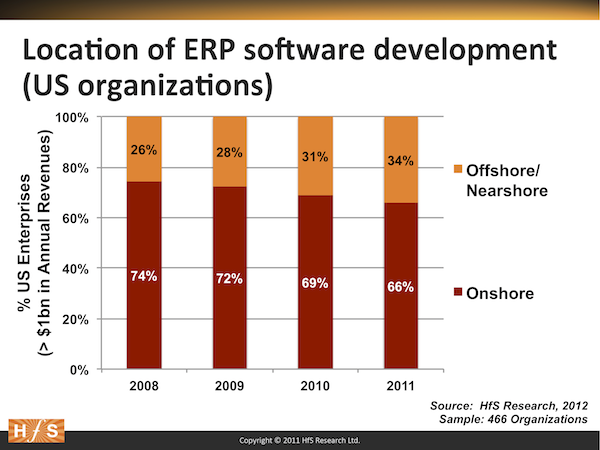
Wonder if I'll get an invitation to Nasscom?
As per usual, election year brings up the age-old argument about how to combat the “threat” of outsourcing. However, let’s not forget this is nothing new..I recall in 2004 when an HR Outsourcing conference was subjected to a vociferous demonstration by anti-outsourcing protesters (I mean – seriously – HRO? Most of it is onshore in any case).
Today’s angry hoards of protesters are (and quite rightly so) expressing anger at the obscene wealth generated by Wall St, and barely even notice the fact that real “American” companies, such as Apple, employs 500,000 people in Chinese factories and that lovely “American” Hanes underwear brand employs thousands of people in Vietnamese sweatshops.
Yes, the argument is boring, flawed and jaded, and while politicians need to be seen to be against it, they do little to prevent it. However, one major stride of progress that Obama emphasized during his recent State of the Union speech has been how the US automotive industry has been brought back from the brink:
“This blueprint begins with American manufacturing. On the day I took office, our auto industry was on the verge of collapse. Some even said we should let it die. With a million jobs at stake, I refused to let that happen. In exchange for help, we demanded responsibility. We got workers and automakers to settle their differences. We got the industry to retool and restructure. Today, General Motors is back on top as the world’s number one automaker. Chrysler has grown faster in the U.S. than any major car company. Ford is investing billions in U.S. plants and factories. And together, the entire industry added nearly 160,000 jobs.
“We bet on American workers. We bet on American ingenuity. And tonight, the American auto industry is back.
“What’s happening in Detroit can happen in other industries. It can happen in Cleveland and Pittsburgh and Raleigh. We can’t bring back every job that’s left our shores. But right now, it’s getting more expensive to do business in places like China. Meanwhile, America is more productive.”
Why is the experience of the resurgent US automotive industry significant to resurrecting its flagging IT industry?
Let’s not beat around the bush here. The US onshore IT industry has ceded much of its dominance to India in recent years. While three-quarters of ERP development work was performed onshore in 2008, the proportion has today decreased to 65%:
I’m not going to get into the tedium of this latest wave of toothless “protection” acts aimed at creating tax incentives / disincentives, and other various penalties and inconveniences for US organizations which dare to employ foreign labor outside of the country to service their business operations and manufacture their wares. Simply put, there are already US IT services firms, such as Systems in Motion, pushing services at US enterprises with wage rates comparable, and often even cheaper, than those of Bangalore – especially those which leverage resources in low-cost onshore locations such as Michigan. And while some niche onshore providers are finding pockets of business and growth for themselves, you can’t ignore the bigger picture that the US onshore IT industry is on the decline. At HfS, we’ve even seen enterprises actually declining to use onshore US IT services firms which underbid their Indian competition, because many of these buyers of services are so invested in the Indian IT brand. Today, many senior IT executives within US organizations actually prefer to invest in their Indian IT relationships than their US ones!
The Bottom-line: It’s time for government to help re-brand US IT services
While the US IT services industry is nowhere near the state of distress that the US auto industry found itself during the last Recession, isn’t it now clear that the only way for the government to stimulate the success of its onshore industries is to invest in them, to aggressively help them, to encourage them to hire locally with real investment? By investing so heavily in their automotive industry, they also re-branded the entire American automotive business. Nothing’s worse than a business in financial decline, and by giving automotive a helping hand, they also improved the perception and credibility of the entire US automotive industry.
The Chinese and Indian governments, as examples, constantly invest in their local business to help them grow and be successful – so why can’t the US government do the same for its flagging IT industry, that it did for automotive?
I, for one, would be happy to see my tax dollars being re-invested in stimulating local industries and job creation in growth industries like IT services and Cloud computing, BPO, social media and medical research, so why not follow the example of how the US automotive industry was salvaged and do the same for IT? Invest in some local companies… hire train and their local workforces to support our organizations’ IT systems. Small measures never work, waste everyone’s time and allow our more aggressive foreign counterparts to advance further ahead in industries such as global IT services. Isn’t now the time, in an election year, to stop the rhetoric and actually make commitments to growing local industries that have a direct impact?
Posted in : Business Process Outsourcing (BPO), Cloud Computing, IT Outsourcing / IT Services, Sourcing Locations








Agree completely – could be a great restart to a lagging industry.
Perhaps there should be significant tax advantages to individuals and organizations bringing offshore money back on home soil. Tax advantages that can only be realized by reinvestment in core areas like infrastructure so this time it truly does trickle down. And really insourcing is a very short sighted answer in an increasly smaller more connected world.
Tara Kelly
The wages for US IT ERP consultants are extremely high (~$300K/annum), without any true merit compared to other hardworking similar fields. No wonder, there will always be some better cost alternative to be found to contain costs, and also there is shortage of resources when the demand for these skills is in higher number of people required. IT unemployment rate in US is very low compared to other industries. Also, IT jobs can always be brought back very easily unlike manufacturing field, if the unemployment rate in IT industry grows as the control of IT operations is still within the US. Not sure if IT industry is in a state, where it needs to be rescued!
“isn’t it now clear that the only way for the government to stimulate the success of its onshore industries is to invest in them,”
Phil – You’re political leanings are rather glaring showing here… 😉
Agreed – too much dependency is definitely self defeating. US is good in developing technology and must leverage it to keep jobs inshore – Take the case of publishing industry where many activities that can be done inshore are outsourced to India or China – simple jobs like basic document editing where documents need to be first converted into editable text before editing are sent to India and china, these documents are easily convertable online in real time instead of need to send to India or China and then easy part of editing could be done inshore.
Or take for example XML tagging, once again tools are available to efficiently do inshore than sending to India where hundreds and thousands of workers keep putting the tags manually day in and day out…
Phil,
Your best blog for a while. Really good talk-track on where government needs to prioritize – less rhetoric, more action!
Graham
@Bill Huber:
Hi Bill – wasn’t it Dubbya whose last act was to bail out GM?
My political affiliations are tied to what makes sense in creating jobs and growth – not some liberal-socio agenda 🙂
And one more thing – all this talk about big government etc., but who ran to the help of the banks when they were all taking us under? Seems like there is one rule for some, and those rules shift when it doesn’t affect them financially….
PF
FWIW, I didn’t agree with Dubya on a lot of things… ’nuff said!
Our government is trillions of dollars in debt. The US Postal Service and Amtrak regularly lose billions. Our tax laws are beyond comprehension. These are not the kind of people I would ask for advice on how to run my business or our industry.
Phil – quit being so politically correct. Obama’s never inviting you back to the Vineyard after the punch bowl incident with the illegal domestic wait staff.
The issue with global sourcing is becoming as much about availability of accessible skills as it is lower costs. Also, western firms increasingly get growth from offshore markets, not local markets mired in debt and striving for growth levels in the 2-3% range, so why not services from those same markets. And manufacturing, with long tangible – and has recently been shown – fragile supply chains, is a different situation from global services. Policies should reflect market realities not try and deny them.
Phil,
I couldn’t agree more with your arguments here. The conversation shouldn’t be about whether one rigidly follows a political party policy – it needs to be one about how government can help grow and promote its domestic industries. Why else has China won the manufacturing game, and India IT services? Because their governments actively helped their businesses with significant financial backing. How else were GM and Chrysler turned around? Great marketing, new products? Ring the other bell! We’ve left our domestic industries to flounder for far too long – it’s time to get them on the right track and slow down the constant flow of jobs and investment to other countries,
Paul
It is time we looked beyond country borders and became truly global citizens. If “American” companies can do business outside the Americas and earn their dollars, why cant they get the services from those “local markets” ?
A government can enable growth by different promotions, but cant make a business viable – that is a decision that i sbest left to business !
[…] work outsourced so they can focus on the higher-value work inhouse. As we once revealed here, two-thirds of ERP development work is still run onshore. Ambitious CIOs these days like to focus their time on ecommerce, mobility, “Big […]